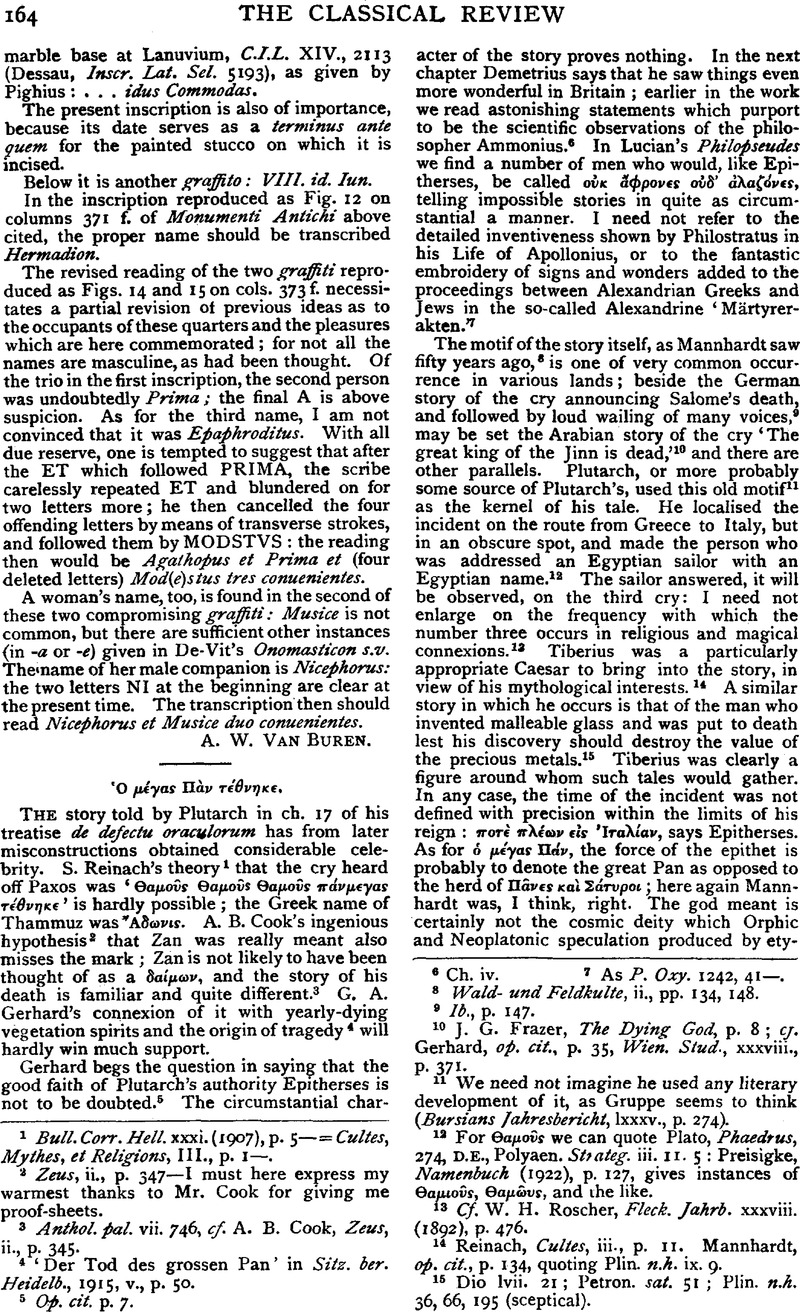No CrossRef data available.

page 164 note 1 Bull. Corr. Hell. xxxi. (1907), p. 5—= Cultes, Mythes, et Religions, III., p. 1—.
page 164 note 2 Zeus, ii., p. 347–1 must here express my warmest thanks to Mr. Cook for giving me proof-sheets.
page 164 note 3 Anthol.pal. vii. 746, cf. A. B. Cook, Zeus, ii., p. 345.
page 164 note 4 ‘Der Tod des grossen Pan’ in Sitz. ber. Heidelb., 1915, v., p. 50.
page 164 note 5 Op. cit. p. 7.
page 164 note 6 Ch. iv.
page 164 note 7 As P. Oxy. 1242, 41—.
page 164 note 8 Wald- und Feldkulte, ii., pp. 134, 148.
page 164 note 9 Ib., p. 147.
page 164 note 10 Frazer, J. G., The Dying God, p. 8Google Scholar ; cj. Gerhard, op. cit., p. 35, Wien. Stud., xxxviii., P. 371.
page 164 note 11 We need not imagine he used any literary development of it, as Gruppe seems to think (Bursians Jahresbericht, lxxxv., p. 274).
page 164 note 12 For Θαμος we can quote Plato, Phaedrus, 274, D.E., Polyaen. Strateg. iii. 11. 5 : Preisigke, Namenbuch (1922), p. 127, gives instances of Θαμιος, Θαμς and the like.
page 164 note 13 Cf.. Roscher, W. H., Fleck. Jahrb. xxxviii. (1892), p. 476.Google Scholar
page 164 note 14 Reinach, Cultes, iii., p. 11. Mannhardt, op. cit., p. 134, quoting Plin. n.h. ix. 9.
page 164 note 16 Dio lvii. 21 ; Petron. sat. 51 ; Plin. n.h. 36, 66, 195 (sceptical).
page 165 note 1 On whom cf. Roscher, W. H., Festschrift Overbeck, p. 56.Google Scholar
page 165 note 2 As Roscher, W. H., Fleck. Jahrb., xxxviii. (1892), p. 465.Google Scholar
page 165 note 3 Cf. Müller, B., Diss. phil. Hal. XXI., iii., p. 349, for the evidence.Google Scholar
page 165 note 4 Hdt. vi. 105 ; cf. Pausan. i. 28.4, ![]() .
.
page 165 note 5 λαλαλα with its broader vowel is a cry of quite different character, made with the mouth wider open ; more of a man's cheer and less of a woman's shriek. The man with the sistrum on the H. Triada processional vase (latest discussion, M. Hammarström in Acta Acad. Aboensis Humaniora III., 1922, No. 2) may be raising this cry, certainly not an λολυγ, for his mouth is wide open.